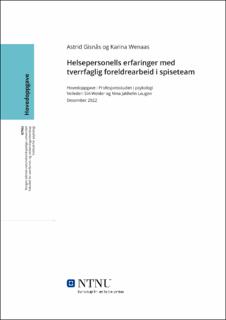Helsepersonells erfaringer med tverrfaglig foreldrearbeid i spiseteam
Master thesis
Permanent lenke
https://hdl.handle.net/11250/3056831Utgivelsesdato
2022Metadata
Vis full innførselSamlinger
- Institutt for psykologi [3086]
Sammendrag
Spisevansker hos barn kan komme til uttrykk som et anstrengt forhold til måltidsituasjoner, vegring mot å spise, og/eller et selektivt eller begrenset spisemønster. Som følge av spisevanskers komplekse og sammensatte natur, anbefales en tverrfaglig tilnærming i behandling av denne problematikken. Tidligere forskning på spisevansker hos barn har fokusert på organiseringen og effekten av tverrfaglige behandlingsteam, såkalte spiseteam, samt foreldres erfaringer med en slik oppfølging. Det eksisterer derimot lite eller ingenforskning på erfaringene til fagpersonene som jobber innenfor rammene av disse tverrfaglige spiseteamene. Denne studiens formål har derfor vært å generere kunnskap og innsikt i helsepersonells erfaringer med tverrfaglig samarbeid for å hjelpe foreldre til barn med spisevansker. Datamaterialet har blitt samlet inn gjennom et fokusgruppeintervju med seks informanter fra Spiseteam BUK Øya ved St. Olavs hospital, og deretter blitt analysert med refleksiv tematisk analyse. Studien er utført innenfor et kritisk-realistisk rammeverk.Oppsummert indikerer resultatene at informantene opplever det som nyttig å hjelpe foreldrene til barn med spisevansker gjennom en tverrfaglig tilnærming. Det kommer frem at de erfarer det tverrfaglige samarbeidet som effektivt og at den helhetlige tilnærmingen fører til god pasientbehandling. En viktig medvirkende årsak til dette er at de gjennom kompetanseutveksling og fordeling av arbeidsoppgaver opplever at de blir mer og mer samkjørte. Relatert til dette erfarer de at de gjennom det tverrfaglige samarbeidet har funnet tilnærminger som står sentralt i foreldrearbeidet på tvers av profesjoner, hvor særlig trygging trekkes frem som sentralt. Fokuset på trygging ses i sammenheng med hvilke mekanismer spiseteamet erfarer at har innvirkning på deres arbeid. En opplevelse er at et snevrerenormalbegrep angående barns spising og matvaner kan medføre uhensiktsmessig bekymring og stress blant foreldre. Dette belyser at det kreves mer kunnskap og forskning på området for å kunne forebygge alvorlige spisevansker. Nøkkelord: spisevansker, spiseteam, tverrfaglig samarbeid, tverrfaglighet, foreldre, biopsykososial modell, kritisk realisme, refleksiv tematisk analyse Feeding disorders in children may be expressed as a strained relationship to situations involving meals, aversion to eating and/or a selective or limited eating pattern. As a result of the complex and composite nature of feeding disorders, an interdisciplinary approach is recommended in the treatment of this problem. Previous research of feeding disorders in children has focused on the organization and effect of interdisciplinary treatment teams, so-called feeding teams, as well as the experience of parents with such follow-up. Notwithstanding, little or no research exists on the experiences of the professionals working within the framework of these interdisciplinary feeding teams. Therefore, the aim of this study has been to generate knowledge and insights into the experiences of health personnel with interdisciplinary collaboration in order to help parents of children with feeding disorders. The data has been collected through a focus group interview with six informants from Spiseteam BUK Øya (Feeding Team at Øya’s Children’s and Youth Clinic) at St. Olav’s Hospital, and thereafter analyzed with reflexive thematic analysis. The study is conducted within a critical-realistic framework.In summary, the results indicate that the informants find it useful to help the parents of children with feeding disorders through an interdisciplinary approach. It appears that they experience the interdisciplinary collaboration as effective and that the holistic approach leads to good treatment of the patients. An important contributing factor to this is that through exchange of expertise and distribution of work tasks, they experience that they become progressively more coordinated. In relation to this, they find that through the interdisciplinary collaboration, approaches have been discovered that are central to parental work across professions, where reassurance is highlighted as central. The focus on reassurance is seen in the context of which mechanisms the feeding team experiences as having an impact on their work. One experience is that a narrower concept of what is considered normal regarding the eating habits of children can lead to inappropriate worry and stress among parents. This illustrates that more knowledge and research is required in the field in order to be able to prevent severe feeding disorders. Key words: feeding disorder, feeding team, interdisciplinary collaboration, interdisciplinarity, parents, biopsychosocial model, critical realism, reflexive thematic analysis
